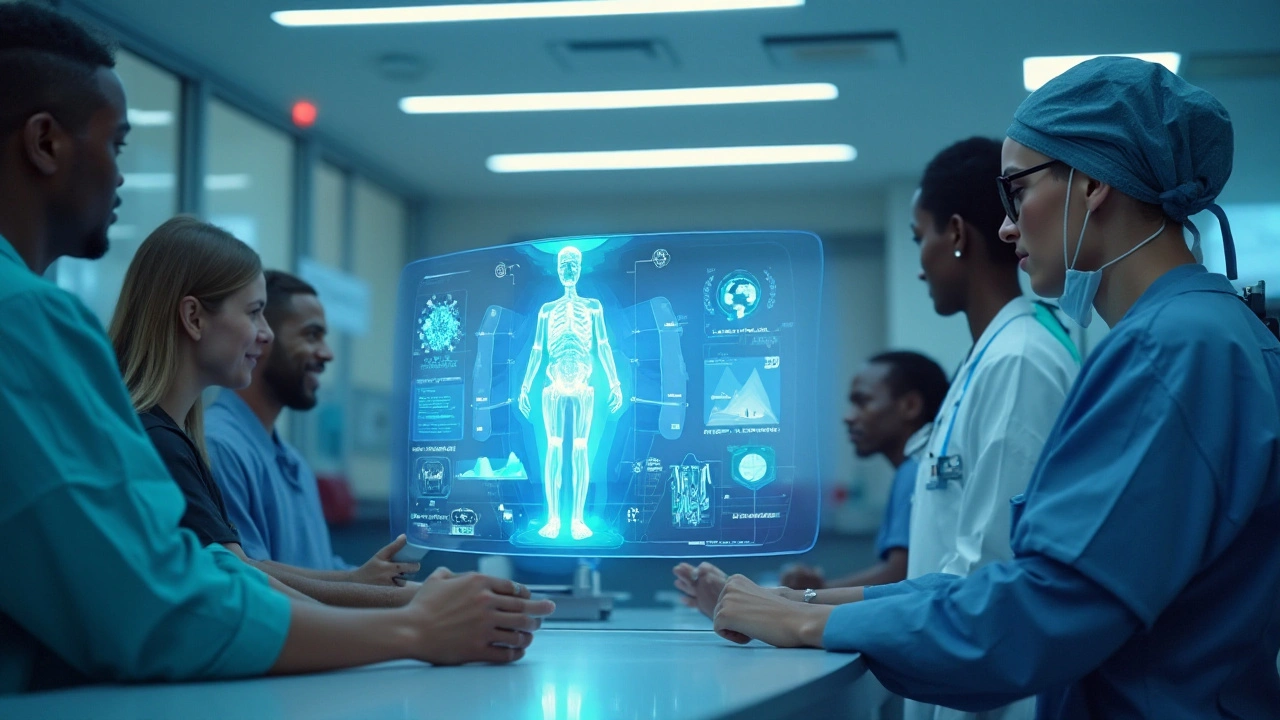Embracing AI: Transforming Modern Life and Society

The world as we know it is undergoing a significant transformation, with artificial intelligence at its core. While the term 'AI' might once have been reserved for science fiction, it now plays a pivotal role in both trivial tasks and groundbreaking innovations. From virtual assistants that manage schedules to complex algorithms that predict patient diagnosis, artificial intelligence is weaving itself into the fabric of society.
Despite the varying levels of excitement and concern about its growth, understanding the expansive reach of AI is crucial. As we enter this new era, a balance must be struck to ensure advancements serve humanity's best interests. Through a closer look at AI's current status and potential to change settings like healthcare and education, we can start to envisage a future where technology enhances human capability in symbiotic harmony.
- The Evolution of AI in Society
- AI in Healthcare: Revolutionizing Treatment
- Impact of AI on Education Systems
- AI in Daily Life: Practical Applications
- Ethical and Future Considerations
The Evolution of AI in Society
Artificial Intelligence has traversed a fascinating journey from its theoretical inception to tangible reality. The concept of artificial intelligence took root in the mid-20th century, when pioneers like Alan Turing asked whether machines could think. Turing's work laid the theoretical frameworks that would spur decades of research and innovation. By the 1950s and 60s, early AI programs could solve algebra problems and play successful games of chess, albeit with limited capacity.
The real turning point came in the late 20th century, as processing power rapidly advanced. Machines began to defeat human competitors in games like chess and Go, showcasing the burgeoning potential of AI. In 1997, Deep Blue defeated world chess champion Garry Kasparov, a landmark victory for AI. This era also witnessed the integration of AI in Society, with applications from factory automation to customer service chatbots. This integration was not just about replacing humans but enhancing productivity and efficiency.
Entering the 21st century, AI's role has expanded exponentially due to the rise of machine learning and deep learning. Technologies like natural language processing and computer vision have allowed machines to interpret, understand, and respond to data in powerful new ways. Companies across industries began harnessing the capabilities of AI to analyze vast troves of data, leading to intelligent insights and smarter decision-making processes. AI now influences commerce, healthcare, transportation, and more, molding modern life's vibrancy and complexity.
Yet, the integration is not devoid of challenges. Ethical questions arise about security, privacy, and job displacement, as seen in recent debates over extensive data collection and autonomous systems. As Bill Gates insightfully remarked, "AI is just the latest in the lineup of powerful forces that affect our lives," hinting at the considerable impact yet assuring the adaptability of human innovation. The potential to address societal challenges through AI, from mitigating climate change to revolutionizing education, lies within our grasp.
Looking to the future, the promise of AI continues to captivate imaginations while reshaping societal norms. With continuous advancements, AI could redefine elements of life that currently seem static, presenting both opportunities and responsibilities. As we navigate this evolution, it becomes essential to foster dialogue around the balancing act between artificial marvels and the essence of human intuition and empathy, ensuring an equitable and beneficial progression.
AI in Healthcare: Revolutionizing Treatment
Across the globe, the integration of artificial intelligence in the healthcare sector is initiating a profound transformation, one that promises to enhance patient care and streamline clinical processes. AI's potential to sift through vast amounts of data rapidly and identify patterns that might elude human practitioners is already proving invaluable. One of the significant developments in this area is the use of AI for diagnosing diseases with unprecedented accuracy. For instance, machine learning algorithms have been successfully used to analyze medical imaging and detect early signs of diseases such as cancer, often outperforming human radiologists. By significantly reducing the margin for error, AI is not only saving time but also lives, offering a glimpse into a future where technology and medicine work harmoniously.
AI's impact, however, goes beyond diagnostics. The technology is being enlisted to develop personalized medicine, tailor-fitting treatment plans that take into account an individual’s genetics, lifestyle, and even the specifics of their disease. Unlike traditional 'one-size-fits-all' approaches, precision medicine looks to optimize the efficacy of care by considering unique patient characteristics. A report published by the National Institutes of Health notes that prescription drugs are more likely to succeed if treatment is personalized. It's this potential to individualize care where AI excels, analyzing vast datasets at a pace unmatched by humans.
Bryan F. Plummer, a leading AI researcher, emphasizes, "Hyper-personalization in medicine is not a distant dream. AI is transforming it into reality, allowing us to harness the depth of our genetic blueprints to deliver better health outcomes."
But AI’s contributions to healthcare aren't isolated to diagnostics and treatment customization. In recent years, AI technologies have become instrumental in drug discovery, significantly cutting down the time and cost associated with developing new medicines. Traditional drug creation methods often take over a decade; now, AI models are able to predict the efficacy and safety of potential new drugs more swiftly. Innovative companies are employing AI algorithms capable of simulating millions of chemical interactions, speeding up the identification of viable drug candidates. Impressively, a recent AI-developed drug entered human clinical trials, highlighting a major milestone in AI's role in medicine.
Human-machine interaction is evolving in hospitals too. AI-powered robots are assisting surgeries, enhancing precision, and minimizing human error. While clinicians oversee these procedures, robots carry out repetitive tasks with absolute consistency, and some are even equipped with machine learning systems that adapt to real-time feedback. This collaboration between AI and healthcare professionals is reshaping surgical practices profoundly. According to a survey by the American College of Surgeons, 75% of robotic-assisted procedures result in fewer complications, marking a revolutionary step for patient recovery times and overall surgical outcomes.
Yet, as with any transformative technology, AI in healthcare brings with it ethical and privacy concerns. Although it offers vast benefits, questions about data protection and the potential for AI decision-making errors remain pertinent. There are ongoing discussions about ensuring AI acts in ways that prioritize patient well-being, safeguarding against bias in AI systems, and guaranteeing transparency in decision-making processes. The healthcare industry is tasked with navigating these challenges meticulously to ensure responsible AI application.
The future of AI in healthcare is bright, with potential applications anticipated to touch every corner of this field. With its ability to merge vast datasets into understandable information, AI stands ready to support medical professionals like never before. As it continues to fuse with both human expertise and intuition, it sets a course towards a revolutionary way of improving health systems globally, promising a new standard of care that's both intelligent and considerate.

Impact of AI on Education Systems
Artificial intelligence is reshaping education, unlocking doors to personalized learning previously unimagined. At its core, AI's role in education revolves around its ability to adapt to individual needs, thus tailoring the educational journey to each student. By analyzing vast amounts of data, AI-powered systems can discern a student's strengths and areas of improvement, providing targeted resources to enhance learning. As universities and schools integrate AI technologies, they're witnessing a profound shift in teaching and assessment methodologies. This evolution isn't just about technology but about enriching the educational experience itself. Such personalized learning pathways are proving beneficial, especially in large classrooms where individual attention from teachers may be limited. By bridging gaps in traditional teaching methods, AI is drawing out the potential of every learner, transcending geographical and socioeconomic boundaries. With AI's capacity to offer continuous feedback, students now have the tools to foster a growth mindset, encouraging them to pursue lifelong learning.
AI's influence extends beyond personalized education, offering efficiencies in administrative processes that have long burdened educational institutions. Routine tasks, such as grading and scheduling, are now increasingly automated, allowing educators more time to focus on teaching. This shift not only boosts institutional productivity but also enhanced the quality of education delivered. According to a study conducted by McKinsey, automating routine educational activities could save up to 20-30% of a teacher's time. With AI readily taking charge of these menial tasks, educational leaders can direct resources towards innovative teaching strategies, thereby fostering a more engaged and capable workforce for the future. Moreover, tools like virtual tutors can simulate one-on-one tutoring scenarios, supplementing the guidance that students receive from their educators. As these systems evolve, they'll gain a deeper understanding of content, context, and student nuances, enabling them to support rather than replace the human factor in education.
"AI is not just a tool; it is a partner in crafting the future of education. It personalizes pedagogical approaches in ways we've only begun to comprehend." — Sal Khan, Founder of Khan Academy.
The collaborative potential between AI and education extends even further, preparing students for the realities of an AI-driven world. By exposing students to AI through curriculum, they not only become consumers of technology but also creators of future innovations. Educators are exploring new frontiers with AI, introducing students to concepts of coding, machine learning, and data analysis as part of the mainstream curriculum. This early exposure equips students with critical skills essential for the 21st century, thus taking a significant step in closing the future skills gap. As educational institutions adopt AI-driven pedagogies, interdisciplinary learning is gaining traction, promoting collaboration across different fields of study. With blended learning environments becoming the norm, students learn to navigate both the digital and physical realms seamlessly, honing their abilities to thrive in a digital-first economy.
Adopting AI in education is not without its challenges, however. The ethical considerations and privacy concerns surrounding the extensive use of student data warrant careful deliberation. While AI can revolutionize learning, responsible implementation is key. Educators and policymakers need to establish guidelines that protect student data and privacy. Ensuring equitable access to AI tools, especially in underprivileged communities, is vital to prevent widening the educational divide. Continuous research into the long-term implications of AI on learning outcomes will help create a balanced and inclusive educational landscape. In acknowledging these challenges, the potential for AI in education remains unparalleled, promising a revolution that aligns technological advancements with humanistic values.
AI in Daily Life: Practical Applications
In the tapestry of modern living, Artificial Intelligence has seamlessly woven its threads, simplifying and enriching our experiences. Imagine waking up, and before your coffee is brewed, AI is already at work – tuning your thermostat, offering a daily news digest, and predicting the quickest route to work. Voice-activated assistants, like Amazon's Alexa or Apple's Siri, serve as the entry points into AI for many. They can manage reminders, adjust settings in your smart home, and even tell you jokes, illustrating the blend of utility and entertainment.
Our smartphones, the ubiquitous gadgets in our pockets, embody AI's impact with features like facial recognition and digital photography enhancements. When snapping a photograph, these devices use AI to recognize scenery, adjust lighting, and enhance focus, ensuring everyone captures that perfect shot. Navigation apps are another stellar example, utilizing AI to analyze traffic patterns in real-time and recommending the swiftest alternate routes. A lesser-known fact perhaps, but platforms like Netflix and Spotify rely on complex algorithms to curate content recommendations, learning from user behavior and preferences.
Home and Personal Life
In our homes, AI-driven appliances can observe usage patterns and optimize energy consumption, making them not only convenient but also eco-friendly. Smart refrigerators might notify you when items are expiring or suggest recipes based on available ingredients, reducing waste and enhancing meal-time creativity. It's fascinating to consider the complexities of these seemingly simple actions, each powered by vast datasets and machine learning models.
On the personal front, AI apps are stretching their capabilities even further. Personalized fitness and wellness curation is available through platforms like Noom or MyFitnessPal, offering diet plans and workouts. These apps dynamically adapt to user inputs and achievements, creating tailor-made regimens through the power of AI. According to a report by Statista, the global fitness app market is projected to surpass $13 billion by 2025, driven largely by innovations in AI technology.
Enhancing Work Efficacy
Businesses have also felt the transformative power of AI. In offices, software bots streamline routine tasks such as data entry and customer queries through chatbots, allowing human workers to focus their creativity and energy on more complex problems. This shift not only enhances productivity but also job satisfaction, as mundane chores are delegated to machine intelligence. A study found that companies using AI tools report time savings of up to 45% on administrative functions.
"AI doesn't take jobs – it takes the drudgery from the jobs." – Reid Hoffman
Even in the creative realms, AI is making significant strides. Tools like Grammarly use artificial intelligence to refine writing and ensure clarity of communication, proving beneficial in professional and personal writing endeavours. The potential doesn't stop at the present; AI's learning algorithms will only continue to grow smarter and more adaptable to individual needs and styles.
The future looks promising as continued AI developments are set to enhance our daily lives unpredictably. While it’s important to celebrate the milestones AI has helped us achieve, society must also remain vigilant to ensure the ethical integration of these technologies into our daily lives, protecting privacy and human interests while embracing innovation.

Ethical and Future Considerations
As we delve deeper into the age of artificial intelligence, it's important to weigh the ethical implications that come with its integration into society. The capabilities of AI indeed hold promise, but this promise must be aligned with moral and ethical standards to ensure technology enhances humanity rather than undermines it. One major consideration involves privacy. As more data is collected to train and improve AI systems, the potential for misuse grows. Who owns the data, and how is it protected? These are significant questions to ponder, as recent data breaches and privacy concerns have shown. The balance between innovation and privacy must be struck carefully to uphold trust in AI systems.
Another ethical consideration is bias in AI systems. Algorithms are often only as objective as the data fed into them. If that data carries biases, so will the output. This has real-world implications, such as perpetuating stereotypes or unfair treatment in technology-driven decisions, such as hiring processes or law enforcement practices. It's essential to develop AI systems with fairness and equity in mind, stripping bias wherever possible. This requires diverse teams with varied perspectives to design these systems.
"The quest to achieve true and unbiased AI is riddled with challenges, but it is a pursuit worth every investment," stated Dr. Timnit Gebru, a renowned AI ethics researcher.
Looking to the future, we must also consider the impact of AI on employment. While some fear that AI might replace human jobs, others see it as an opportunity to redefine the nature of work. Routine and mundane tasks might be automated, leaving humans to focus on creative and complex tasks that AI cannot yet perform. This shift will require a rethinking of education and skill development to prepare the workforce for the jobs of tomorrow. The possibility of a world where AI and humans work side by side in harmony offers an optimistic view, but it must be approached with caution and preparation.
The governance and regulation of AI are crucial components of navigating its future trajectory. Ensuring that laws and policies keep pace with technological advancements is a challenge. Effective international cooperation and policy-making are essential to safeguard against misuse and ensure AI is used for the common good. Organizations and governments must collaborate to create standards and guidelines that protect individuals and entities without stifling innovation.
Finally, we must consider long-term philosophical questions. What will it mean to be human in a world where AI is ubiquitous? Could AI ultimately develop consciousness, and if so, what rights would such entities have? While these questions might seem far off, addressing them now can lay the groundwork for a more thoughtful integration of AI into society. The evolution of AI is a journey filled with rich potential, but it also demands that humanity proceed with mindfulness and responsibility, ensuring that technology advances in tandem with human values and ethics.